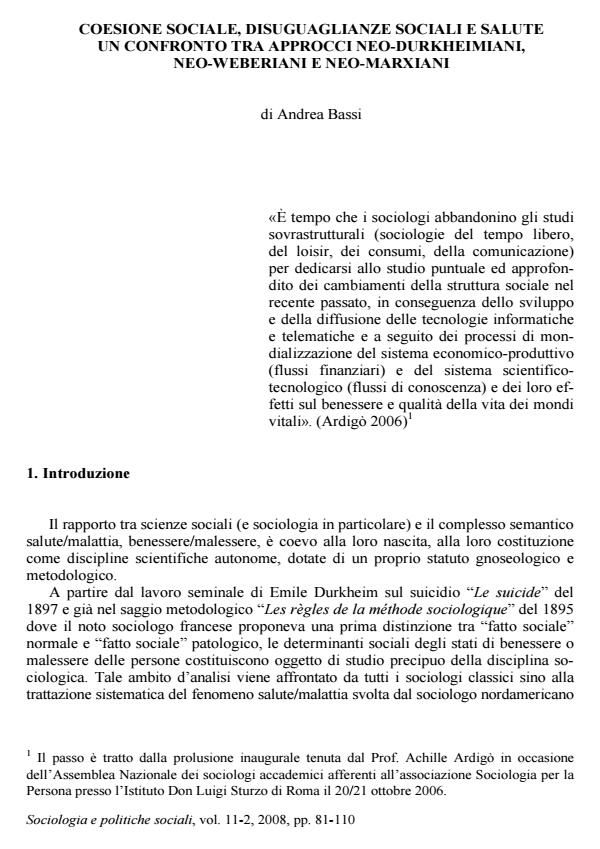Coesione sociale, disuguaglianze sociali e salute un confronto tra approcci neo-durkheimiani, neo-weberiani e neo-marxiani
Titolo Rivista SOCIOLOGIA E POLITICHE SOCIALI
Autori/Curatori Andrea Bassi
Anno di pubblicazione 2008 Fascicolo 2008/2
Lingua Italiano Numero pagine 30 P. 81-110 Dimensione file 268 KB
DOI
Il DOI è il codice a barre della proprietà intellettuale: per saperne di più
clicca qui
Qui sotto puoi vedere in anteprima la prima pagina di questo articolo.
Se questo articolo ti interessa, lo puoi acquistare (e scaricare in formato pdf) seguendo le facili indicazioni per acquistare il download credit. Acquista Download Credits per scaricare questo Articolo in formato PDF

FrancoAngeli è membro della Publishers International Linking Association, Inc (PILA)associazione indipendente e non profit per facilitare (attraverso i servizi tecnologici implementati da CrossRef.org) l’accesso degli studiosi ai contenuti digitali nelle pubblicazioni professionali e scientifiche
Social Cohesion, Social Inequalities and Health. A Comparison of Neo- Durkheimians, Neo-Weberians and Neo-Marxians Approaches - The aim of the article is to introduce a wide bibliography in the field of social epidemiology concerning the social determinants of health in developed societies. The key point is about the role that the concept of social cohesion held inside the research program of Richard Wilkinson, the main author of the neo-durkheimian approach to the socio-economic determinants of health. Wilkinson, analysing a huge amount of data from several international surveys, suggests a causal relation between level of income distribution, degree of social cohesion and health status of a population. This relationship is consistent with a variety of indicators: life expectation, death rate, specific death rates, infant mortality, etc. To Wilkinson, the more egalitarian societies (societies with less income inequalities and with high level of social cohesion) are the one that show the higher levels of healthy population. Bassi analyses the works of the authors that criticize the neo-durkheimian approach and that adopt neo-marxian or neo-weberian approaches. The former give a central role to the social stratification e to class differences, the latter giving emphasis to the socio-economic status and the self-perception of personal well-being. Finally, the Author presents the researches of those scholars that follow Wilkinson’s analyses with the intention to improve it and to add new variables in the process of explanation. Keywords: social cohesion; social inequalities; health; social theory.
Andrea Bassi, Coesione sociale, disuguaglianze sociali e salute un confronto tra approcci neo-durkheimiani, neo-weberiani e neo-marxiani in "SOCIOLOGIA E POLITICHE SOCIALI" 2/2008, pp 81-110, DOI: